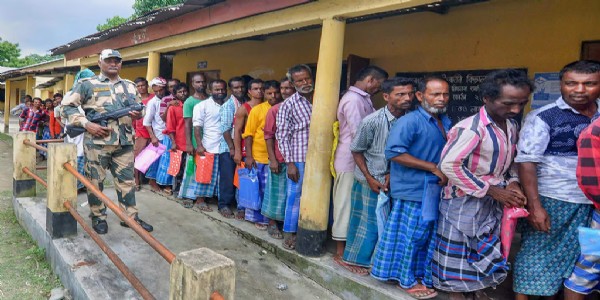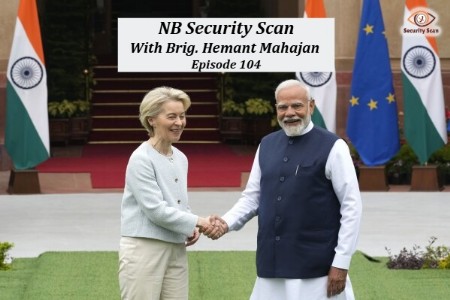Partition on the basis of religion was a 'historic mistake': Rajnath Singh
The 1971 War was a reminder that India’s partition on religious lines was a historic mistake, and that Pakistan has ever since continued to engage in a proxy-war against India.
Total Views | 353
New Delhi, Dec 13: As the government commemorates India’s victory over Pakistan in 1971 War and also led to the liberation of Bangladesh, Defence Minister Rajnath Singh said that the 1971 War was a reminder that India’s partition on religious lines was an “aitihasik galti” (historic mistake), and that Pakistan has ever since continued to engage in a proxy-war against India.
Singh was speaking at the inauguration of Swarnim Vijay Parv at India Gate in the national capital, marking 50 years of India’s victory in the 1971 war as well as the Indo-Bangladesh friendship. He termed the 1971 war as among the most decisive wars in the world after the two World Wars in the 20th century.

"This war tells us that the partition of India on the basis of religion was a historic mistake. Pakistan was born in the name of one religion but it could not remain one. After the defeat of 1971, it is continuously fighting a proxy war. Pakistan wants to disrupt peace in India by promoting terrorism and other anti-India activities. The Indian forces had foiled their plans in 1971 and work to eliminate terrorism from its root is in underway. We have won in a direct war and the victory will be ours in indirect war as well," he said.
Singh added, "the anti-India feeling in Pakistan can be seen from the fact that they name their missiles after invaders who attacked India - Ghori, Ghaznavi, Abdali, whereas India's missiles are named Akash, Prithvi, Agni. Now one of our missiles has also been named Sant". He congratulated Defence Research & Development Organisation (DRDO) for the successful flight test of indigenously designed and developed helicopter-launched Stand-off Anti-tank (SANT) Missile from Pokhran ranges on December 11, 2021.
Also Read: 1971 Indo Pak War: Beyond seas and bays, towards the ocean
He also described the 1971 war as a shining example of jointness and integration among the three Services, underlining the importance of planning, training and fighting together. He said, "the Government is leaving no stone unturned to strengthen the Armed Forces. The creation of the post of Chief of Defence Staff and Department of Military Affairs are some of the reforms that will cater to the future needs of the Armed Forces. From procurement to production, all efforts are being made to make the forces more capable, efficient and self-reliant."
"Through the Aatmanirbhar Bharat Abhiyan, efforts are being made to promote self-reliance in the defence sector. Our aim is to keep our Armed Forces ready for any eventuality,” he said. Recalling the liberation of Goa in 1961, Singh said, “the struggle was a witness to the fact that the more someone tries to divide us, the more united we become and face our enemies.”
‘Swarnim Vijay Parv’ as a festival which commemorates the glorious victory of the Indian Armed Forces in the 1971 war, which changed the history and geography of South Asia, he said. He paid tributes to the brave Indian soldiers, sailors & air warriors and their families who ensured the victory in the 1971 war, saying that the country will always be indebted to their sacrifice.
Also Read: Indo-Pakistan War, 1971: With No Lessons Learnt, Pakistani Belligerence Continues
Singh remembered the determination, coordination and valour of the Indian Armed Forces during the war. “Our Armed Forces supported ‘Muktivahini’, helped lakhs of refugees and prevented any kind of aggression from western & northern sector. They ensured that the credibility of India's commitment towards peace, justice and humanity in the world community is maintained,” he added.
The Minister also said, the 1971 war is a classic example of India’s morals and democratic traditions. “It will be rarely seen in history that after defeating another country in a war, a country does not impose its dominance, but hands over power to its political representative. India did this, because it is a part of our culture. India has never invaded any country, nor has it ever captured an inch of land of any other country,” he said. He recalled India’s contribution in the establishment of democracy in Bangladesh and appreciated the fact that it has progressed rapidly on the path of development in the last 50 years, which is an inspiration for the world.
Also Read: President Kovind to visit Bangladesh for 50th 'Victory Day' celebrations from Dec 15-17
The event will also mark the culmination of the year-long journey of the Victory Flame, the Swarnim Vijay Mashal which, having traversed the length and breadth of the country and collected soil samples from the villages of the gallant soldiers of the war, will converge in New Delhi on December 16, 2021 in a grand ceremony.




